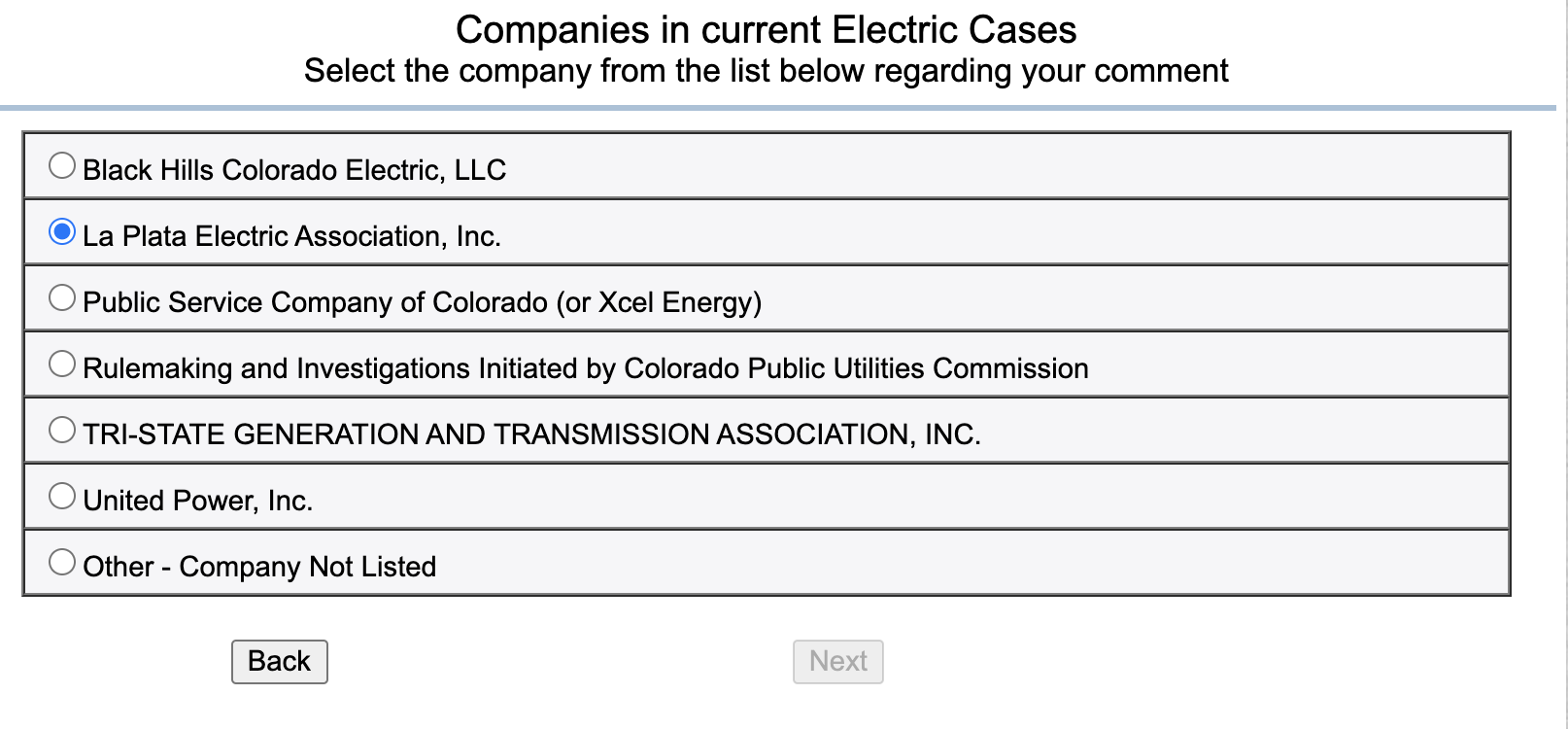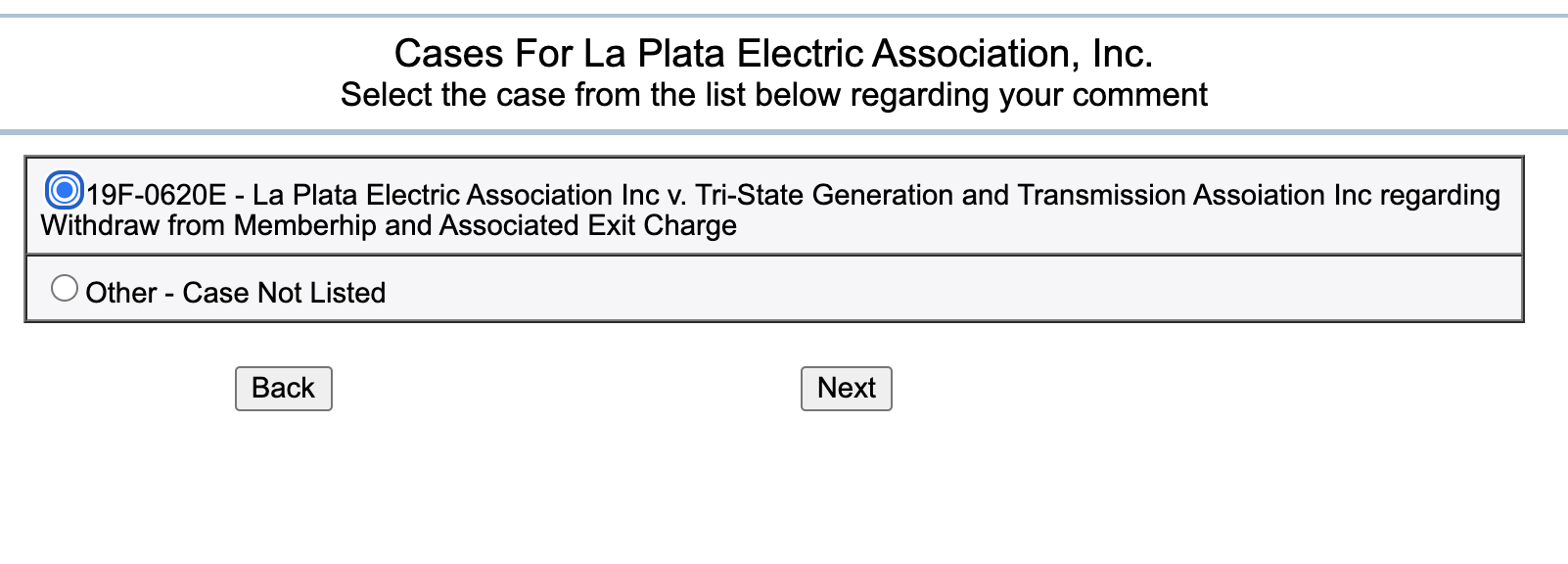Keep LPEA’s Exit Charge Case in Colorado
LPEA has made huge headway in its fight for cleaner, cheaper power here in Southwest Colorado. But by illegally adding new members to the cooperative “family”, Tri-State qualified for federal regulation – pre-empting current state regulation under the Colorado Public Utilities Commission (PUC). We need you to tell the PUC to rule that Tri-State’s new members were added illegally so that the PUC can keep its jurisdiction and LPEA can keep moving forward.
What’s Happening:
It gets a little wonky here, so hang on! If you want a deeper dive into these issues, we’ve got more detail at the bottom of the page.
As part of its strategy to attain cheaper, cleaner power, LPEA has been exploring a buyout from its power provider, Tri-State. LPEA asked for an exit charge estimate last year, and when Tri-State refused to give it to them, LPEA filed a complaint at the Colorado Public Utilities Commission (PUC). Last month, the PUC gave a preliminary ruling which held that Tri-State had been unjust, unreasonable, and discriminatory by not providing LPEA with an exit fee. The PUC also was moving towards determining an exit fee methodology for LPEA, and was going to issue a final decision in November. This was great news- LPEA was closer than ever to being able to best evaluate its options for member-owners!
But while all of this was going on, Tri-State was angling for federal regulation under the Federal Energy Regulatory Commission (FERC) so that the PUC wouldn’t have authority over these kinds of disputes. FERC regulation puts cooperatives trying to exit Tri-State at a severe disadvantage – exactly what Tri-State wants.
To qualify for FERC regulation and pre-empt the PUC’s jurisdiction over exit charge disputes, Tri-State added three non-utility members- illegally! If Tri-State continues with FERC regulation, LPEA will lose all the progress it’s made at the PUC and will have to restart at FERC- a process that will take significantly longer and be much more expensive.
We need your voice to be heard to keep this case firmly under state regulation so that LPEA can keep moving towards a future of cleaner, cheaper power: tell the Colorado PUC that Tri-State’s additional members were added illegally & that the PUC must therefore keep its jurisdiction over Tri-State.
Tips for Comments
- Include the docket numbers: 19F-0620E and 19F-0621E.
- Personalize it. Communicate these talking points in your own words in your comment to the Colorado PUC. Tell the PUC why this is an important issue to you.
Talking Points
Tri-State’s addition of new non-utility members was illegal under Colorado law, and hence the PUC should keep jurisdiction over Tri-State
The PUC must reject Tri-State’s addition of the non-utility members because:
- Tri-State did not add these non-utility members for a legitimate, lawful purpose. Instead, Tri-State purported to add these non-utility members to undermine the Colorado PUC’s jurisdiction to determine just and reasonable exit charges for Tri-State members—a fact Tri-State has freely admitted.
- The non-utility members do not purchase electricity from Tri-State, do not have an actual and legitimate ownership interest in Tri-State, and do not elect a director to sit on the Tri-State board of directors.
- Tri-State has also openly suggested that it can easily shed FERC jurisdiction when it is no longer expedient.This jurisdictional shell game makes the purported addition of these non-utility members ineffective and impermissible under Colorado law.
How to Make a Comment
1. Click on the button below to go to the PUC’s website
2. Select “La Plata Electric Association”

3. Select the first option: “19F-0620E – La Plata Electric Association Inc v. Tri-State Generation and Transmission Assoiation Inc regarding Withdraw from Memberhip and Associated Exit Charge”

4. Enter your information, write your comment, and be sure to include both docket numbers, 19F-0620E and 19F-0621E. Then, click submit and you’re done!
Having trouble making a comment? Email info@sanjuancitizens.org for support.
More Background Information:
Here in Southwest Colorado, we get our power from La Plata Electric Association (LPEA), an electric cooperative that in turn buys its power from Tri-State Generation and Transmission. Tri-State’s flaws are varied and well-documented; among them, LPEA is stuck in a restrictive, long-term energy contract that limits our local generation and forces us to pay high rates for dirty, expensive power.
LPEA has embarked on a three-pronged strategy to attain cheaper, cleaner power for communities in La Plata and Archuleta counties. One of those prongs is exploring a buyout from Tri-State so LPEA can forge its own path and find cheaper power elsewhere. To that end, LPEA asked Tri-State for a buyout number last July, and when Tri-State refused to give it to them, LPEA filed at the PUC. LPEA is closer than ever to achieving its buyout estimation in order to best evaluate its options for member-owners, but regulation under FERC would be an enormous setback.
LPEA has already spent huge amounts of time, money, and effort at the Colorado PUC on this exit case. FERC also has not even decided on an exit fee methodology, something that could get tied up for much longer than the November 5th PUC deadline. Plus, disputes at FERC are much more expensive, take longer, and are much farther away than dealing with things right at the PUC.
When Tri-State was owned only by electric cooperatives, it was exempt from federal regulation. So Tri-State added three new non-utility members to undermine the PUC and qualify for FERC regulation- MIECO, Inc. (a gas supplier), Ellgen Ranch (a cattle ranch), and Olson’s Greenhouses (a greenhouse). Since Tri-State didn’t add these members consistent with Colorado law, Tri-State should remain wholly-owned by members (like LPEA). And that would mean that Tri-State does not qualify for FERC regulation, and would remain under the PUC.




